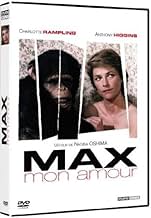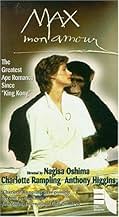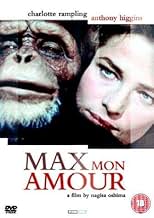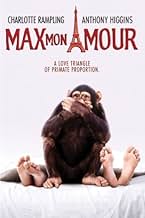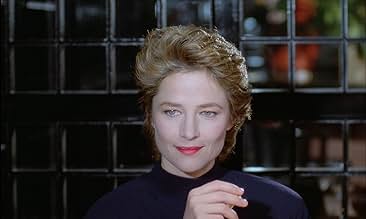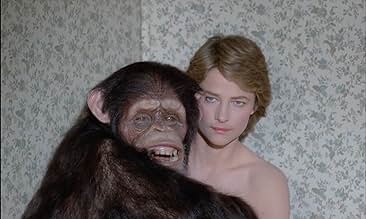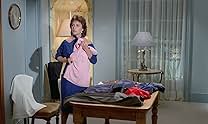VALUTAZIONE IMDb
6,0/10
1363
LA TUA VALUTAZIONE
Aggiungi una trama nella tua linguaA married French woman takes a zoo chimp named Max to be her lover.A married French woman takes a zoo chimp named Max to be her lover.A married French woman takes a zoo chimp named Max to be her lover.
- Regia
- Sceneggiatura
- Star
- Premi
- 2 candidature totali
Bernard-Pierre Donnadieu
- Archibald
- (as Bernard Pierre Donnadieu)
Bonnafet Tarbouriech
- Le vétérinaire
- (as Pierre Bonnafet)
Recensioni in evidenza
Interesting - an international co-production that results in a real creative fusion, not the usual mush. This movie pits deadpan surrealist aesthete Jean-Claude Carriere's script against tantrum-prone transgressor Oshima in the service of a narrative where Charlotte Rampling falls in love with a chimpanzee. In spite of the rampant in-your-face perversity, though, Carriere holds the balance of power - Oshima wouldn't have thrown in that climactic victory parade, and I doubt he could have pulled off such an informed spoof of the French bedroom comedy on his own. The bemused passivity of the husband can get a little cloying, but it's pretty remarkable how viscerally sensual the movie gets in the Rampling-chimp lovey sequences. And that goes double once you realize that it ain't no chimp - it's another Rick Baker masterpiece for ya, so that makes three auteurs.
10poikkeus
Seen with an audience in a theater, Max Mon Amour can be a surprising and satisfying parable. When a womanizing diplomat (Anthony Higgins) realizes that his wife (Charlotte Rampling) may be having an affair, he's shocked, then disgusted that this lover is in fact a full-grown chimpanzee. At first, it appears that Rampling may be using the simian to exact emotional revenge on his wife; then, it seems that a special kind of love might be in play - which inflames his jealousy to the point of violence.
Nagisa Oshima frames the film as an offbeat comedy, but it's hard to ignore ignore its themes, which include the blindness of love, questioning to what degree we're human or animal. To the very last scenes, it's difficult to predict that will happen to the chimp or the strange romance. It's presented almost entirely without music, and filmed in French and English - as if to say the language spoken here is beyond words, speaking the language of the heart.
Of particular note is the rendering of the chimp, which is presented so realistically that you almost believe it's real. Charlotte Rampling is enigmatic and sensual as Max's "lover."
Nagisa Oshima frames the film as an offbeat comedy, but it's hard to ignore ignore its themes, which include the blindness of love, questioning to what degree we're human or animal. To the very last scenes, it's difficult to predict that will happen to the chimp or the strange romance. It's presented almost entirely without music, and filmed in French and English - as if to say the language spoken here is beyond words, speaking the language of the heart.
Of particular note is the rendering of the chimp, which is presented so realistically that you almost believe it's real. Charlotte Rampling is enigmatic and sensual as Max's "lover."
MAX, MON AMOUR received a tepid reaction when it debuted in Cannes in 1986, a French- American co-production under the rein of the late Japanese provocateur Nagisa Ôshima (1932- 2013), which would become his penultimate feature film.
Since then, it has become a succès de scandale which is less being watched than hyped due to its subversive content, but in fact, most of the time, it suffices as a tongue-in-cheek comedy, a marital satire borne out of Jean-Claude Carrière's urtext, Peter Jones (Higgins) is a liberal-minded British diplomat working and living in Paris, one day, to his utter dismay, he finds out the paramour of his wife Margaret (Rampling), is a male chimpanzee named Max, beggar belief, the couple decides to try out a kind of ménage-à-trois by bringing Max into their official residence, where also lives their towhead school-age son Nelson (Hovik), and believe it or not, in the end of the story, their co-habitation actually works.
Cagey about the salacious details of the relationship between Margaret and her "supposed" primate lover, Ôshima sides with the husband's point-of-view to parse the couple's tug-of-war, firstly, Peter takes up the gauntlet to show his magnanimity by accepting the situation without letting it get under his skin, then, driven by curiosity and jealousy, his attitude towards Max seesaws between hostility and respectable concern, an experiment of corroborating the inter- species sexual act is a bust, whereas an episode of shotgun scare is just a cheeky practice of cheap tension.
It is an immoral cock-and-bull story, menace is palpable, but vice has never descended into the picture and what sagaciously affirming is the film's brazen stance on the dynamism between the couple, it is always Margaret who has the say-so in their states of affairs, however preposterous and quixotic, there is a deep respect unites them as an entity, Peter stoutly fights her corner in the face of extrinsic parties, whether it is a zoologist or a neuropsychologist, accordingly, she also quite frank about her feelings, even stays on friendly terms with Peter's secretary-cum-lover Camille (a gratingly loud Diana Quick).
It is a surprise that Ôshima chooses not to go out on a limb in salting the plot by bestowing Max with a feral complexion, alternatively played by real chimps and stunts in verisimilar costumes (solely by this reviewer's reckoning), Max is presented as a meek pet, not dangerous, sulky at most, albeit his human-like size, even becomes mawkishly lovelorn and loses his appetite when Margaret is absent. Granted, there is a touching and tender naiveness seething beneath its surrealistic premise, which also is not exactly congruent with Ôshima's make-up if one might venture to surmise.
Both Rampling and Higgins tackle the thorny subject with bravura, what percolates from their collective effort is a beguilingly unfeigned sophistication stemming from a bourgeois background, and Ôshima conspiratorially sends up their caprices with deadpan seriousness, not to mention a non sequitur triumph appended to the part where Max momentarily goes missing in the woods.
Ultimately, MAX, MON AMOUR doesn't come to provoke moralists, but offers a keyhole for the audience to observe a behavioral pattern says as much of living beings' universality as their idiosyncrasy, the point is made, but reverberations are somewhat deadened when Ôshima settles for a middle road between "funny and die" in his overall approach.
Since then, it has become a succès de scandale which is less being watched than hyped due to its subversive content, but in fact, most of the time, it suffices as a tongue-in-cheek comedy, a marital satire borne out of Jean-Claude Carrière's urtext, Peter Jones (Higgins) is a liberal-minded British diplomat working and living in Paris, one day, to his utter dismay, he finds out the paramour of his wife Margaret (Rampling), is a male chimpanzee named Max, beggar belief, the couple decides to try out a kind of ménage-à-trois by bringing Max into their official residence, where also lives their towhead school-age son Nelson (Hovik), and believe it or not, in the end of the story, their co-habitation actually works.
Cagey about the salacious details of the relationship between Margaret and her "supposed" primate lover, Ôshima sides with the husband's point-of-view to parse the couple's tug-of-war, firstly, Peter takes up the gauntlet to show his magnanimity by accepting the situation without letting it get under his skin, then, driven by curiosity and jealousy, his attitude towards Max seesaws between hostility and respectable concern, an experiment of corroborating the inter- species sexual act is a bust, whereas an episode of shotgun scare is just a cheeky practice of cheap tension.
It is an immoral cock-and-bull story, menace is palpable, but vice has never descended into the picture and what sagaciously affirming is the film's brazen stance on the dynamism between the couple, it is always Margaret who has the say-so in their states of affairs, however preposterous and quixotic, there is a deep respect unites them as an entity, Peter stoutly fights her corner in the face of extrinsic parties, whether it is a zoologist or a neuropsychologist, accordingly, she also quite frank about her feelings, even stays on friendly terms with Peter's secretary-cum-lover Camille (a gratingly loud Diana Quick).
It is a surprise that Ôshima chooses not to go out on a limb in salting the plot by bestowing Max with a feral complexion, alternatively played by real chimps and stunts in verisimilar costumes (solely by this reviewer's reckoning), Max is presented as a meek pet, not dangerous, sulky at most, albeit his human-like size, even becomes mawkishly lovelorn and loses his appetite when Margaret is absent. Granted, there is a touching and tender naiveness seething beneath its surrealistic premise, which also is not exactly congruent with Ôshima's make-up if one might venture to surmise.
Both Rampling and Higgins tackle the thorny subject with bravura, what percolates from their collective effort is a beguilingly unfeigned sophistication stemming from a bourgeois background, and Ôshima conspiratorially sends up their caprices with deadpan seriousness, not to mention a non sequitur triumph appended to the part where Max momentarily goes missing in the woods.
Ultimately, MAX, MON AMOUR doesn't come to provoke moralists, but offers a keyhole for the audience to observe a behavioral pattern says as much of living beings' universality as their idiosyncrasy, the point is made, but reverberations are somewhat deadened when Ôshima settles for a middle road between "funny and die" in his overall approach.
This is a humorously brilliant little film from renown Japanese director Nagisha Oshima with dialogue which flows between French and English and a storyline all about Zoophilia. Nicely compliments the newly released R-100. They would make a nice double feature together.
The film follows a French diplomat who suspects his wife is having an affair, after he finds out she has been secretly renting a second apartment from a private investigator he had hired.
When he goes to investigate for himself, he walks in on his wife....naked...in bed with a Chimpanzee.
Flabbergasted by the whole thing, he doesn't know what to think.
But, out of sheer curiosity, he accepts his wife's kinky fetish...and even asks her to bring Max (the chimp, which is more likely some dude in a chimp costume...or a puppet) to come and live with them and their son.
The most awkward and hilarious scene occurs when the couple has friends over for dinner- during which they hear Max screaming. Curious themselves, they ask to meet him. But when they bring him out he pretty much molests his human lover in front of their friends.
The film focuses less on the lustful aspects of the human-chimpanzee relationship, though, than it does on the psychological journey which our protagonist is swept through, as he tries to understand his wife's psychological condition...not to mention an attempt to fathom what exactly goes on between them behind closed doors. He needs to know...and it's driving him mad.
The entire spectacle is hilarious, and filled with bestial and zoophilic innuendo. Like when Peter's secretary/mistress set's the Queen up to visit a stud farm. At one point, Peter (the husband) hires a prostitute, and pays her to attempt to get Max to have sex with her...so he can watch (although, as it turns out....she wasn't his type...totally mine though!).
While hilarious from start to finish, I wouldn't exactly qualify this explicitly as a comedy. It's comedic element is more a result of the truly bizarre nature of the thematic content (from the perspective of general normality, if such a thing exists), than it is from a brazen attempt to make you laugh. The jokes require a bit of reflection, at least.
When all is said and done this a truly imaginative and deviant piece of cinema that should be experienced by everyone. It will make you think. It will make you laugh. And it will make you go "WHAT THE F**K!?". What more can you ask for, really? Oshima has nice framing too! 8.5 out for 10.
The film follows a French diplomat who suspects his wife is having an affair, after he finds out she has been secretly renting a second apartment from a private investigator he had hired.
When he goes to investigate for himself, he walks in on his wife....naked...in bed with a Chimpanzee.
Flabbergasted by the whole thing, he doesn't know what to think.
But, out of sheer curiosity, he accepts his wife's kinky fetish...and even asks her to bring Max (the chimp, which is more likely some dude in a chimp costume...or a puppet) to come and live with them and their son.
The most awkward and hilarious scene occurs when the couple has friends over for dinner- during which they hear Max screaming. Curious themselves, they ask to meet him. But when they bring him out he pretty much molests his human lover in front of their friends.
The film focuses less on the lustful aspects of the human-chimpanzee relationship, though, than it does on the psychological journey which our protagonist is swept through, as he tries to understand his wife's psychological condition...not to mention an attempt to fathom what exactly goes on between them behind closed doors. He needs to know...and it's driving him mad.
The entire spectacle is hilarious, and filled with bestial and zoophilic innuendo. Like when Peter's secretary/mistress set's the Queen up to visit a stud farm. At one point, Peter (the husband) hires a prostitute, and pays her to attempt to get Max to have sex with her...so he can watch (although, as it turns out....she wasn't his type...totally mine though!).
While hilarious from start to finish, I wouldn't exactly qualify this explicitly as a comedy. It's comedic element is more a result of the truly bizarre nature of the thematic content (from the perspective of general normality, if such a thing exists), than it is from a brazen attempt to make you laugh. The jokes require a bit of reflection, at least.
When all is said and done this a truly imaginative and deviant piece of cinema that should be experienced by everyone. It will make you think. It will make you laugh. And it will make you go "WHAT THE F**K!?". What more can you ask for, really? Oshima has nice framing too! 8.5 out for 10.
Mainly, this film is about Charlotte Ramplings love for a monkey (a chimpanzee, to be precise), and how her family, especially her husband, deals with it. In fact, upon finding out about his wives affair, Anthony Higgins' character remains surprisingly calm; he even proposes to have the monkey live with them in their house. Maybe he wants to prevent Rampling from leaving him; or he does so since he has an affair himself; or it is his attempt to be "open minded" even in front of an utmost unusual matter. But problems soon up: Not only does the maid (young Victoria Abril!) respond negative to the new guest; the couples friends slowly find up about the hidden secret and try to "help" by drawing in psychologist, zoologists, and so forth. Then, suddenly, Max, the monkey is gone... Sounds weird? It is. All over the film, one is reminded of some of Luis Bunuels work. In one particular scene, Higgins eager to find if Rampling and Max do indeed share sexual experiences pays a prostitute to "visit" Max, about which she has no problems (other than Max!). One could read it as a commentary about, once again, the lifestyle of the Bourgeoisie and the boredom that drives them, but in fact all of the characters are likable and there's not hint of criticism on social inequalities. It's filmed in a "children film style" way, yet in its contents designed exclusively for adults. It makes for an enjoyable reception, but once you've seen it, it's not something you want to watch it all too soon, since "Max mon Amour" is basically attractive for the unpredictable unfolding of the story.
Lo sapevi?
- QuizOshima originally intended there to be a scene where Max performs cunnilingus on Margaret, but ultimately decided it would be too risque for French cinema.
- ConnessioniFeatured in The Look (2011)
I più visti
Accedi per valutare e creare un elenco di titoli salvati per ottenere consigli personalizzati
- How long is Max My Love?Powered by Alexa
Dettagli
- Data di uscita
- Paesi di origine
- Lingue
- Celebre anche come
- Max My Love
- Luoghi delle riprese
- Aziende produttrici
- Vedi altri crediti dell’azienda su IMDbPro
Contribuisci a questa pagina
Suggerisci una modifica o aggiungi i contenuti mancanti

Divario superiore
By what name was Max amore mio (1986) officially released in Canada in English?
Rispondi

